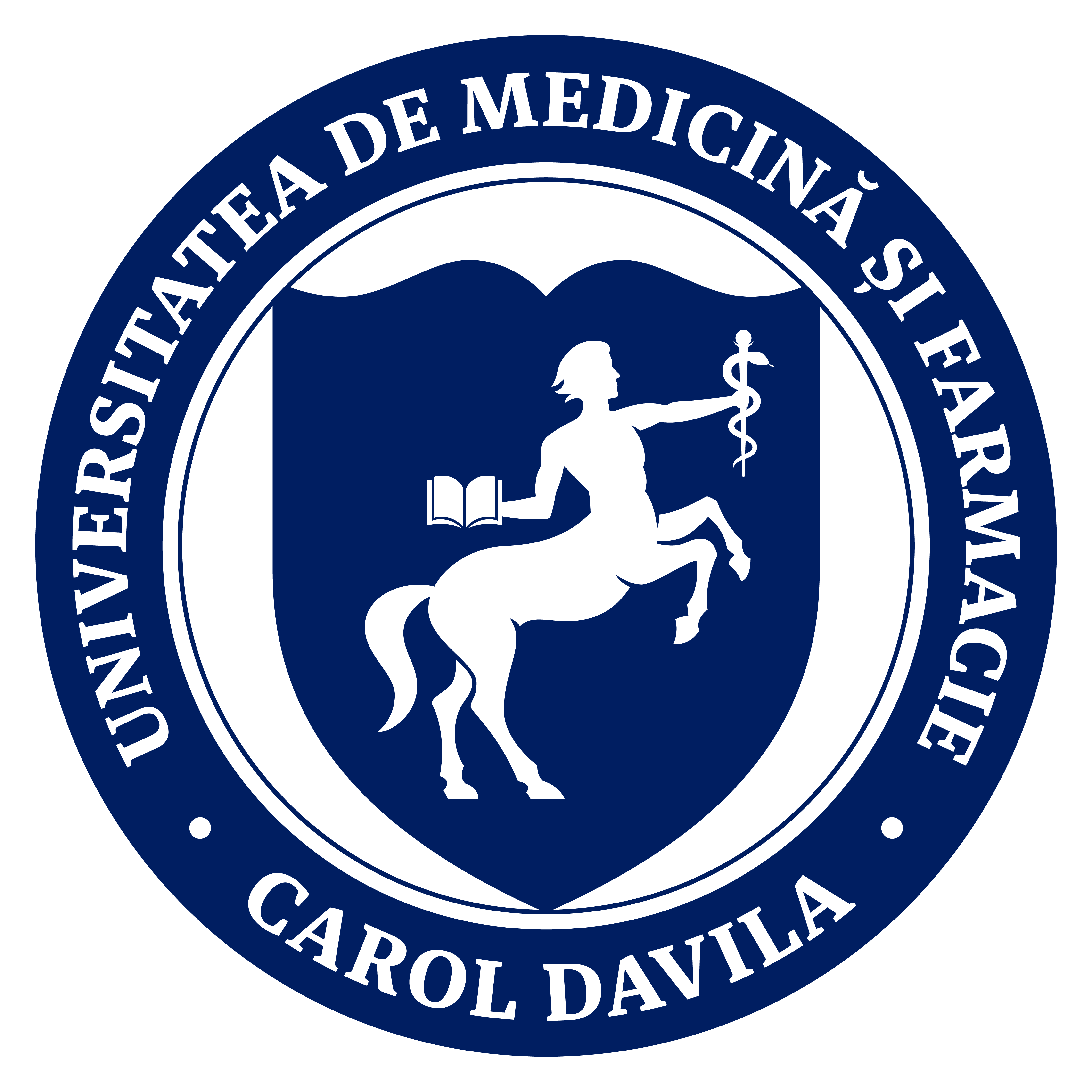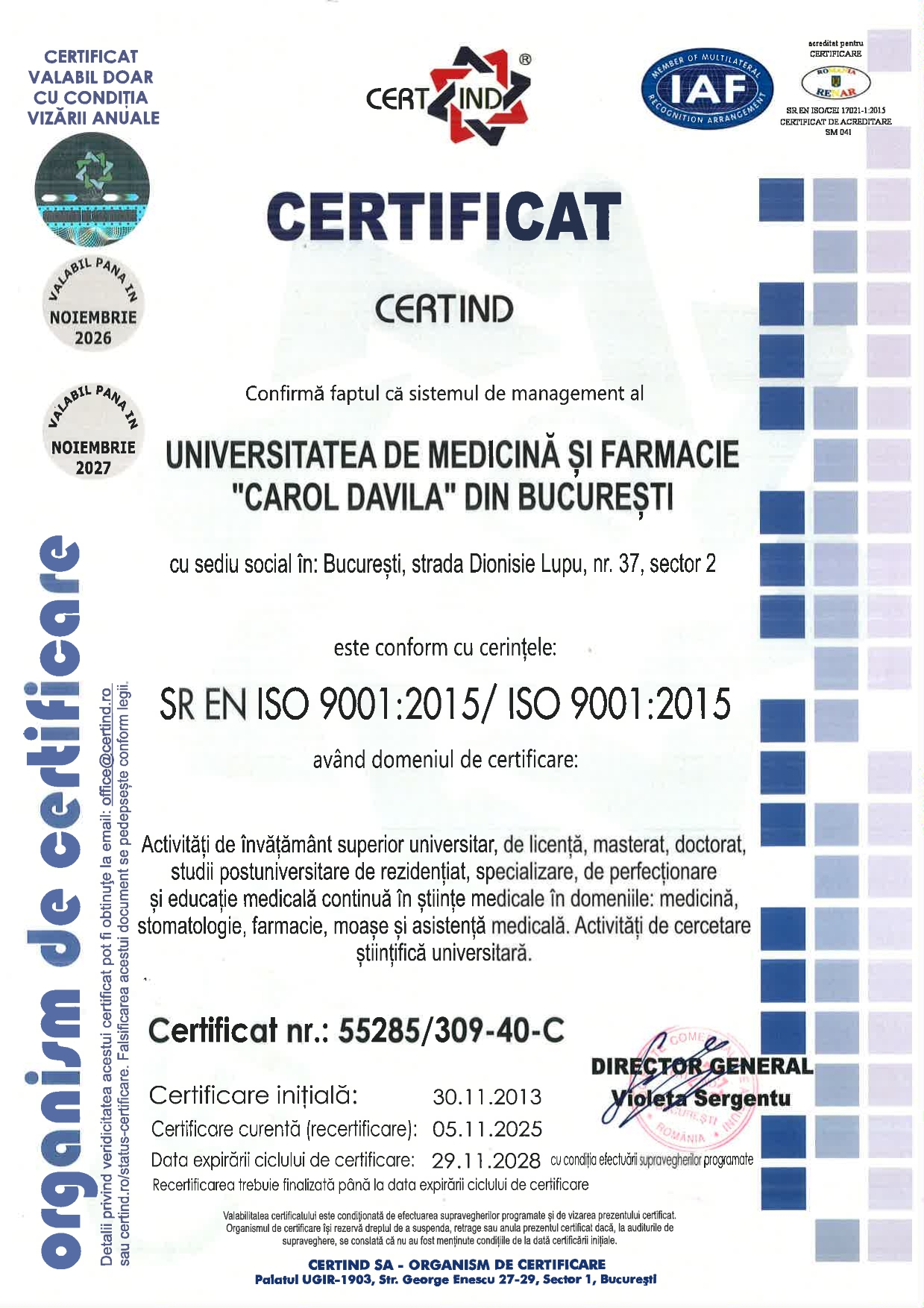- About UMPCD
- Education
- Students
- Research and development
- International relations
Project name: CONFIRMATION OF A PANEL OF NOVEL CANDIDATE PROTEOMIC BIOMARKERS IN SYSTEMIC SCLEROSIS PATIENTS (BIOSSC)
Contract No.: PD 92, 13/08/2020
Project code: PN-III-P1-1.1-PD-2019-0118
Project type: PN-III-P1-1.1-PD (Postdoctoral research grant)
Allocated budget: 246.500 lei
Duration: 01.09.2020-31.08.2022 (24 months)
Research team:
Project leader- Dr Paul-Cristian Bălănescu, Assistant Professor at Research Methodology Chair, Colentina Clinical Hospital, UMF Carol Davila, Bucharest, Romania.
Mentor- Prof. Dr. Cristian Băicuș, Internal Medicine and Research Methodology Chair, Colentina Clinical Hospital, UMF Carol Davila, Bucharest, Romania.
Abstract: Rationale: Systemic sclerosis (Ssc) is an autoimmune disease with incompletely known physiopathology being a challenge for both clinicians and researchers. Research efforts are focusing upon identifying novel and relevant biomarkers that have good predictive values for prognosis, stratification and monitoring therapeutic response of Ssc patients. Studies using high throughput genomic/proteomic platforms have identified numerous candidate biomarkers for Ssc. Nevertheless, independent studies and confirmation of all these candidate biomarkers are needed to be conducted in the clinical setting in order to translate the tremendous information gathered into clinical practice.
Aims: The aim of the project is confirmation of novel promising proteomic biomarkers identified using mass-spectrometry studies already performed on Ssc patients. The outcome of the project will be a panel of promising, confirmed biomarkers associated with clinical characteristics of Ssc that will be useful for clinical practice after validation on Ssc cohort studies.
Foreseen impact: The project has an important impact in translating basic knowledge of Ssc biomarkers into clinical use by conducting a confirmation and validation study of promising biomarkers in a specific clinical setting. It is an important intermediate but mandatory step. The project proposal is in line with the international quest for reliable blood biomarkers for disease/therapy monitoring in Ssc patients, pinpointing and confirming proteomic signature from candidate biomarkers identified with mass spectrometry studies. The project will be able to transform basic research results into clinical practice.
Methodology: In order to confirm selected biomarkers (members of chaperon group of proteins but also other promising candidates) a case control study is envisaged. Patients with Ssc will be selected and samples and data from the available biobank will be included in analysis. The project is divided into 4 specific Work packages.
Estimated results: At least 2 scientific papers indexed in Web of Science Core Collection (ISI/ESCI) are envisaged to be published.
Project results :
- Bălănescu P, Bălănescu A, Bălănescu E, Băicuş C. Candidate proteomic biomarkers in systemic sclerosis discovered using mass-spectrometry: an update of a systematic review (2014-2020). Rom J Intern Med. 2021;59(2):101-111. (ESCI indexed journal)
- Balanescu P, Balanescu E, Baicus C, Balanescu A. S100A6, Calumenin and Cytohesin 2 as Biomarkers for Cutaneous Involvement in Systemic Sclerosis Patients: A Case Control Study. J Pers Med. 2021;11(5):368. (ISI indexed journal, red area)
- Gremlin-1, CD26 and Hsp27 as biomarkers for clinical expression in Caucasian patients with systemic sclerosis- Oral presentation at the IX-th Edition of The University and Pharmacy Carol Davila congress, Bucharest 25-27th November 2021
- Balanescu P, Balanescu E, Baicus C, Balanescu A. Circulatory CK17, MZB1 and LRG1 as biomarkers for disease severity and fibrosis in systemic sclerosis patients. Accepted for publication 20th July 2022 in Biochemia Medica (ISI indexed journal, yellow area).
- Balanescu P, Balanescu E, Baicus C, Balanescu A. Confirmation of MZB1 and LRG1 as biomarkers for systemic sclerosis patients: results of a case-control study. Poster, Autoimmunity 2022, Athens, Greece, 10-13 June 2022.



